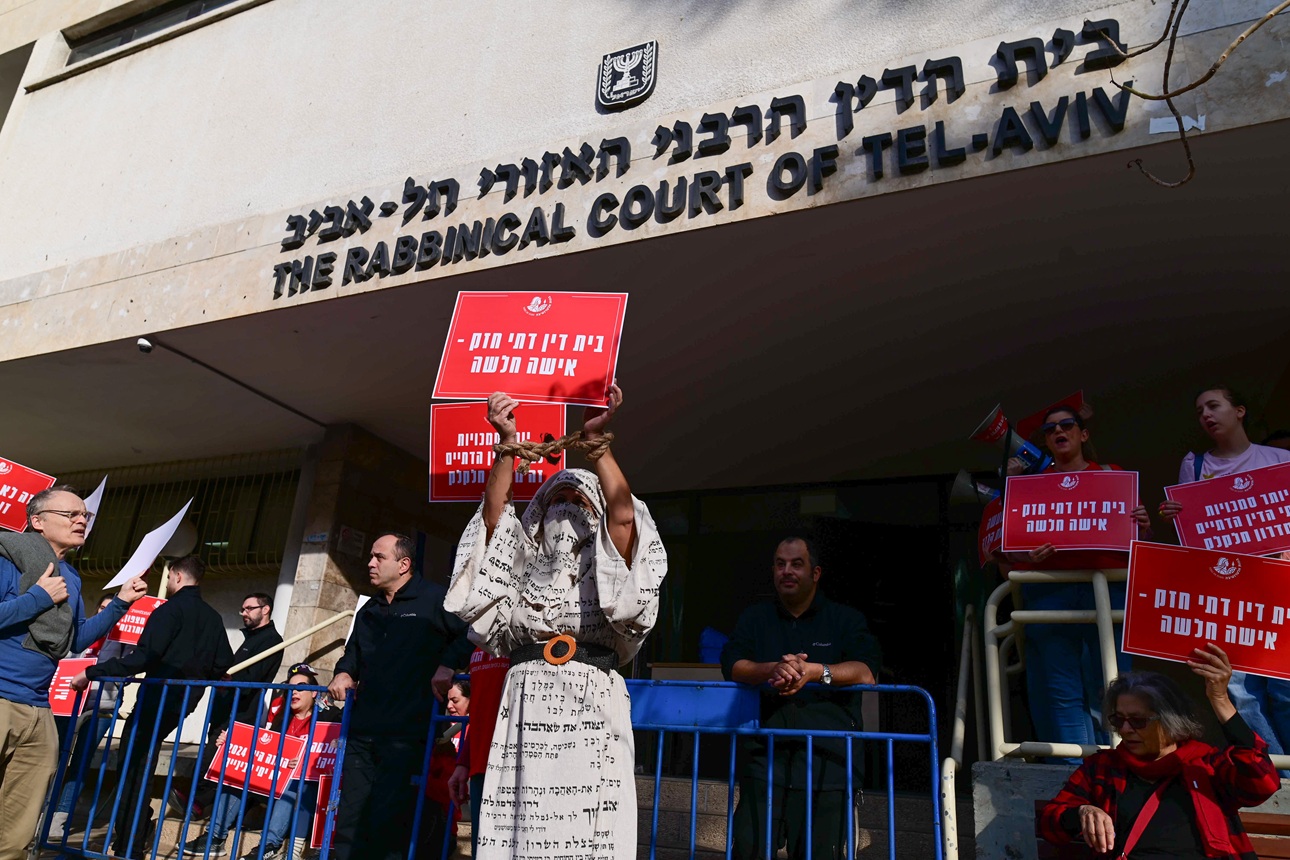Who Will Protect the Vulnerable Parties in Religious Courts?
A bill expanding the powers of Israel's religious courts was approved for first reading in Knesset. This raises concerns about the rights of vulnerable population groups, such as women and low wage workers. As a Jewish and democratic state, it is not enough to say rights will be protect – there must be institutional protections.

The writing on the main sign: "Strong religious court - weak woman" | Photo by Tomer Neuberg/Flash90
Last week, a bill was approved for first reading in Knesset that would expand the powers of religious courts. Participating in the Knesset discussions regarding the bill, I was reminded of Finance Minister Smotrich’s response when asked, in February 2023, who would defend our rights if all the checks on the government were to be removed as part of the judicial overhaul: "I promise to protect human rights", he said.
Currently, the legal matters of marriage and divorce are under the sole authority of Israel's religious courts - a situation that is, in itself, highly unusual in democratic states. The bill in question would further expand their authority, allowing rabbinical courts and Sharia courts to rule as arbitrators on civil matters such as employment disputes, disputes between neighbors, and more, as long as both parties consent. But when the question is raised of who will ensure that the consent given is genuine—especially in cases involving a considerable power imbalance between the parties, such as an employer and a low-wage worker—the answer given is that "we’ll trust in the courts".
MK Yitzhak Pindrus (of the ultra-Orthodox United Torah Judaism Party) went so far as to state that if that if one side does not agree to arbitration in a religious court, then the court will persuade them to acquiesce. This hardly sounds like voluntary consent.
Though the revised version of the bill includes changes that bolster protections against forced consent, there is still no answer to the question of whether a low-wage worker who is afraid of losing her job can object to such proceedings, nor to the question of whether women will be allowed to deliver testimony during hearings, given that religious courts may consider them ineligible to testify.
In an earlier committee hearing for the bill, a representative of the Rabbinical Courts Administration (a part of Israel's judicial system managed by the Ministry of Religious Services) said that "no one can compel religious law to change its restrictions on women". What, then, will happen to a woman who finds herself in such a hearing to which she did not truly consent, and encounters discrimination against her testimony, in a court consisting exclusively of male judges?
Some of the protections included in the bill require the courts to ensure that their rulings abide by laws that protect basic rights, such as the Women’s Equal Rights Law and labor laws. This obligation should be self-evident, but past experience suggests that when religious courts have adjudicated civil matters, they have often ignored these protections. In addition, there are various issues that are not explicitly covered by the legislation specified in the bill, and for which a basic commitment to the values of equality is still required.
The answer is the same: "We will trust in the courts".
This is not just a question of values and worldviews. In some cases, the problem is a lack of expertise. It is no coincidence that labor courts, for example, have been established with exclusive jurisdiction over the adjudication of labor disputes. These are very different from other disputes, and require a deep understanding of labor law. Unquestionably, the rabbinical courts and the Sharia courts do not have any special expertise in these matters.
In the deliberations of the Knesset Constitution, Law and Justice Committee, it was repeatedly argued that there is no difference between the religious courts and private arbitration services, which also cannot guarantee free consent or offer specialized expertise. However, there is a hugely important difference: Private arbitration is as its name implies; it is not publicly funded, and does hold the markings of a state institution, with symbols of government such as the emblem of the state. Thus, it is less likely that one of the parties in arbitration in these settings will mistakenly think that it is under the aegis of the state. In this regard, it was argued in the hearings that the religious courts are preferable because they are supervised institutions, unlike private institutions. But if this is the problem, then the legislature should act to increase the supervision of private arbitration – it should not use it as an excuse to undermine equal protection under the law.
In a review we carried out at the Israel Democracy Institute, we did not find a single democratic country with public, judicial institutions that adjudicate solely on the basis of religious law. Even in the State of Israel, which is both Jewish and democratic, there is no justification for expanding the powers of the religious courts. Those who wish to have their disputes arbitrated on the basis of religious law have a wide selection of private institutions to turn to.
At the same time, the mechanisms for protecting rights, especially for certain population groups, are few in number, and they need to be strengthened, not weakened. In a democracy, institutions are what we rely on to protect people's rights. Mere promises that rights will be preserved are not enough.
This article was published in the Jerusalem Post
